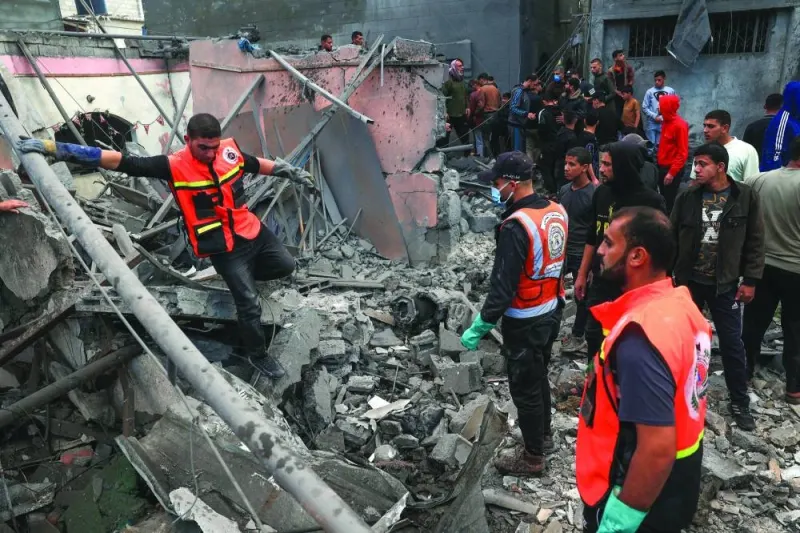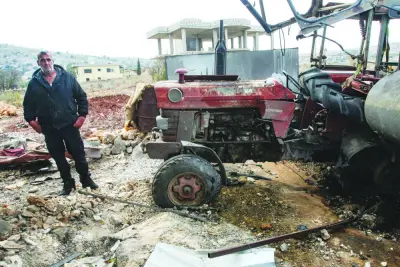
Palestinian medics search for survivors in the rubble of a building following Israeli bombardment in Rafah in the southern Gaza Strip, yesterday, as fighting resumed shortly after the expiration of the truce.
The UN said it deeply regretted the resumption of deadly hostilities in the Gaza Strip yesterday following the end of a truce between Israel and Hamas, calling the situation “catastrophic”.
The UN also said it was troubled by indications that Israel could seek to expand its military offensive inside the Palestinian territory.
Fighting resumed in Gaza immediately after the expiry of a week-long truce, with the first fatalities reported minutes later, according to health officials in the enclave.
“I deeply regret that military operations have started again in Gaza,” UN Secretary-General Antonio Guterres said on X, formerly Twitter.
“I still hope that it will be possible to renew the pause that was established. The return to hostilities only shows how important it is to have a true humanitarian ceasefire.” The week-long truce paused fighting that began in the first week of October when Hamas fighters stormed through Gaza’s militarised border into Israel.
Israel vowed in response to eliminate Hamas and unleashed an air and ground military campaign in Gaza that the territory’s Hamas government says has killed more than 15,000 people, also mostly civilians.
During the truce Hamas freed 80 Israeli hostages in exchange for 240 Palestinian prisoners, and more aid entered Gaza, where about 80% of the population is displaced and short of food and water.
UN human rights chief Volker Turk branded the resumption of hostilities “catastrophic”.
He urged all parties and states with influence to try and bring about a ceasefire on humanitarian and human rights grounds.
“Recent comments by Israeli political and military leaders indicating that they are planning to expand and intensify the military offensive are very troubling,” he added.
“The situation is beyond crisis point.” Turk called for an “immediate end to the violence, the prompt and unconditional release of all remaining hostages, the cessation of firing of indiscriminate rockets and use of explosive weapons with wide-area effects in populated areas.”
UN humanitarian agency OCHA said that despite the return of hostilities, the UN would continue to deliver food, water, medical and other supplies to Gaza in an attempt to save lives.
After a week of respite, “hell on Earth has returned to Gaza”, OCHA spokesman Jens Laerke told a briefing in Geneva.
He said that during the truce, significantly larger convoys of aid, fuel and cooking gas had been able to enter the enclave, including thousands of metric tonnes of aid delivered to the north.
“With the resumption of war, we fear that the continuation of this is now in doubt,” he said.
The UN children’s agency Unicef condemned the resumption of fighting, saying: “Today, those in power have decided that the killing of children would recommence.” Spokesman James Elder said the “dire” state of health, nutrition, water and sanitation threatened to trigger “a disaster of unparalleled magnitude for the children of Gaza”.
“To accept the sacrifice of the children in Gaza is humanity giving up,” he told the Geneva briefing via video-link from the Palestinian enclave.
Elder said he had earlier yesterday revisited children in the Nasser hospital in Khan Yunis in the southern Gaza Strip as hostilities resumed.
“As I was there, ambulances came, people ran with bloody bodies on stretchers,” he said.
He said that during the truce, “slowly, slowly, glimpses of childhood started to come back” to traumatised and wounded children in the hospital, where many families are seeking shelter.
However, as the explosions began again, “in an instant…you saw fear return and childhood retreat”, he said.
The UN also said it was troubled by indications that Israel could seek to expand its military offensive inside the Palestinian territory.
Fighting resumed in Gaza immediately after the expiry of a week-long truce, with the first fatalities reported minutes later, according to health officials in the enclave.
“I deeply regret that military operations have started again in Gaza,” UN Secretary-General Antonio Guterres said on X, formerly Twitter.
“I still hope that it will be possible to renew the pause that was established. The return to hostilities only shows how important it is to have a true humanitarian ceasefire.” The week-long truce paused fighting that began in the first week of October when Hamas fighters stormed through Gaza’s militarised border into Israel.
Israel vowed in response to eliminate Hamas and unleashed an air and ground military campaign in Gaza that the territory’s Hamas government says has killed more than 15,000 people, also mostly civilians.
During the truce Hamas freed 80 Israeli hostages in exchange for 240 Palestinian prisoners, and more aid entered Gaza, where about 80% of the population is displaced and short of food and water.
UN human rights chief Volker Turk branded the resumption of hostilities “catastrophic”.
He urged all parties and states with influence to try and bring about a ceasefire on humanitarian and human rights grounds.
“Recent comments by Israeli political and military leaders indicating that they are planning to expand and intensify the military offensive are very troubling,” he added.
“The situation is beyond crisis point.” Turk called for an “immediate end to the violence, the prompt and unconditional release of all remaining hostages, the cessation of firing of indiscriminate rockets and use of explosive weapons with wide-area effects in populated areas.”
UN humanitarian agency OCHA said that despite the return of hostilities, the UN would continue to deliver food, water, medical and other supplies to Gaza in an attempt to save lives.
After a week of respite, “hell on Earth has returned to Gaza”, OCHA spokesman Jens Laerke told a briefing in Geneva.
He said that during the truce, significantly larger convoys of aid, fuel and cooking gas had been able to enter the enclave, including thousands of metric tonnes of aid delivered to the north.
“With the resumption of war, we fear that the continuation of this is now in doubt,” he said.
The UN children’s agency Unicef condemned the resumption of fighting, saying: “Today, those in power have decided that the killing of children would recommence.” Spokesman James Elder said the “dire” state of health, nutrition, water and sanitation threatened to trigger “a disaster of unparalleled magnitude for the children of Gaza”.
“To accept the sacrifice of the children in Gaza is humanity giving up,” he told the Geneva briefing via video-link from the Palestinian enclave.
Elder said he had earlier yesterday revisited children in the Nasser hospital in Khan Yunis in the southern Gaza Strip as hostilities resumed.
“As I was there, ambulances came, people ran with bloody bodies on stretchers,” he said.
He said that during the truce, “slowly, slowly, glimpses of childhood started to come back” to traumatised and wounded children in the hospital, where many families are seeking shelter.
However, as the explosions began again, “in an instant…you saw fear return and childhood retreat”, he said.
 Kokani.me Kokani.me
Kokani.me Kokani.me


